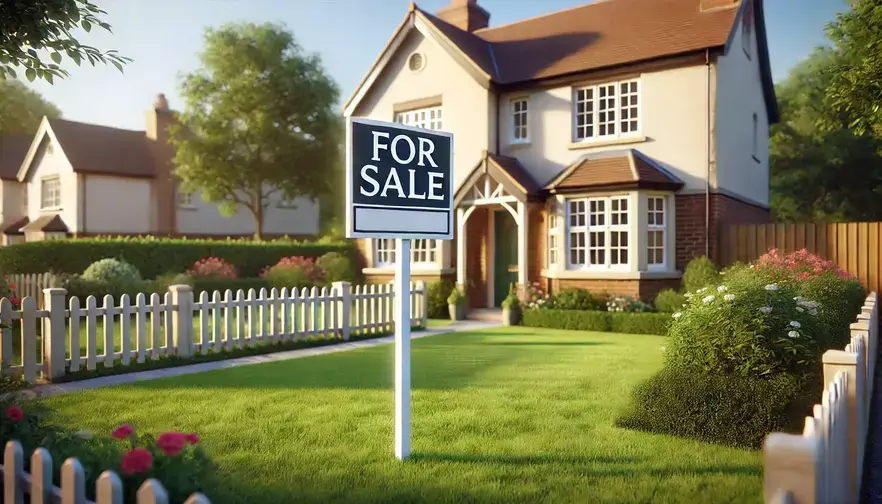Understanding the Role of an Estate Agent
Estate agents play a vital role in the home selling process. They are responsible for marketing your property, arranging viewings, negotiating offers, and handling the legal aspects of the sale. A good estate agent can make the process smoother and help you achieve the best possible price for your home.
Estate agents use their expertise to assess the market value of your property and suggest a competitive asking price. They create marketing strategies to attract potential buyers, which includes listing your property on popular real estate websites, utilizing social media, and leveraging their network of contacts. Additionally, they handle negotiations, ensuring you get the best possible deal, and guide you through the legal paperwork involved in the sale process.
Determining Your Needs
Before you start your search, it's essential to understand your specific needs. Consider the type of property you're selling, your timeline, and any special requirements. Are you selling a family home, a rental property, or a unique heritage property? Your needs will influence the type of estate agent you should choose.
If you're selling a high-value property, you might prefer an agent who specializes in luxury homes. If you need to sell quickly, look for agents known for fast turnovers. Understanding your unique situation will help you narrow down your choices and find an agent who is best equipped to handle your sale.
Types of Estate Agents
Large Agencies
Large agencies often have more resources and a broader reach. They may offer more extensive marketing campaigns and have a larger team to handle various aspects of the sale. However, they might also have a higher volume of clients, which could mean less personalized service.
Large agencies typically have established brand recognition, which can attract more buyers. They often have access to the latest technology and marketing tools, which can enhance the visibility of your property. However, with a larger client base, the level of individual attention you receive may vary.
Independent Agencies
Independent agencies can offer a more personalized experience and often have in-depth local knowledge. They might be more flexible and provide a tailored approach. However, they may have fewer resources compared to larger agencies.
Independent agents are often deeply rooted in the community and have strong local connections. They can provide personalized service and may go the extra mile to ensure your property gets the attention it deserves. On the downside, their reach may be limited compared to larger firms.
DIY Services
DIY services allow homeowners to list and sell their properties with minimal assistance from an estate agent. This option can be more cost-effective but requires more effort and knowledge on the part of the homeowner. It's best suited for those who are confident in handling the sale process themselves.
With DIY services, you have full control over the sale process, from setting the price to negotiating with buyers. While this can save money on agent fees, it also means more responsibility on your part. Be prepared to invest time in marketing, conducting viewings, and managing the paperwork.
Researching Estate Agents
Online Reviews and Recommendations
Start by researching estate agents online. Look for reviews on websites like Google, Trustpilot, and Yelp. Ask friends, family, and neighbours for recommendations. Word-of-mouth referrals can provide valuable insights into an agent's reputation and service quality.
Check the agent's social media profiles and their engagement with clients. Positive reviews and recommendations can give you confidence in their ability to handle your sale effectively. Pay attention to comments about their responsiveness, professionalism, and success in selling properties similar to yours.
Track Record
Check the track record of potential agents. Look at their recent sales history, including the types of properties they've sold and how long those properties were on the market. An agent with a strong track record in selling properties similar to yours is a good sign.
Look for agents who consistently achieve sales close to or above the asking price. This indicates they have a good understanding of market conditions and effective negotiation skills. A proven track record of success is a strong indicator of an agent's competence.
Comparing Services and Fees
Services Offered
Different estate agents offer different services. Common services include property valuations, marketing (online and offline), conducting viewings, negotiating offers, and handling paperwork. Make sure you understand what services are included in their fee.
Some agents may offer additional services like professional photography, virtual tours, and home staging advice. These can enhance your property's appeal and attract more buyers. Ensure you understand the full range of services provided and how they can benefit your sale.
Fee Structures
Estate agent fees can vary widely. Some agents charge a fixed fee, while others take a percentage of the sale price. Typically, fees range from 1% to 3% of the sale price. Be sure to ask about any additional costs, such as marketing expenses or administrative fees.
Compare the fee structures of different agents and consider the value of the services they provide. A higher fee might be justified if the agent offers superior marketing and negotiation skills that result in a higher sale price. Transparency in fees is crucial to avoid unexpected costs.
Interviewing Potential Estate Agents
Key Questions to Ask
When interviewing potential estate agents, ask the following questions:
- How will you market my property?
- What price do you think my home will sell for and why?
- What are your fees?
- How often will you provide updates?
What to Look For
Pay attention to how the agent communicates. Are they professional, knowledgeable, and responsive? Do they listen to your needs and provide clear, honest answers? A good rapport with your agent is essential for a smooth working relationship.
During the interview, assess their enthusiasm and commitment to selling your property. An agent who is genuinely interested in your property and has a clear strategy for selling it is likely to be more effective. Trust your instincts and choose someone you feel comfortable working with.
Checking Credentials and Experience
Credentials
Ensure the estate agent is registered with a professional body such as the National Association of Estate Agents (NAEA) or the Royal Institution of Chartered Surveyors (RICS). These organizations set standards for professionalism and ethics.
Membership in these organizations indicates that the agent adheres to industry standards and best practices. It also provides a level of accountability and recourse if any issues arise during the sale process.
Experience
Ask about the agent's experience in the industry and their familiarity with selling properties like yours. An experienced agent will have a better understanding of the market and how to handle various challenges that may arise.
Experience brings valuable insights into market trends, buyer behaviour, and effective marketing strategies. An agent with a track record of successful sales can navigate potential obstacles and close deals more efficiently.
Evaluating Marketing Strategies
Online Listings
A significant portion of property searches begin online. Ensure the agent has a strong online presence and lists properties on major property websites like Rightmove, Zoopla, and OnTheMarket. Quality photos and detailed descriptions are crucial.
High-quality photos can make your property stand out and attract more potential buyers. Ask if the agent uses professional photographers and how they plan to showcase your property online. Detailed, engaging descriptions can also make a significant difference.
Social Media
Social media platforms can be powerful marketing tools. Ask how the agent uses social media to promote properties. Look for agents who actively engage with potential buyers on platforms like Facebook, Instagram, and LinkedIn.
Social media marketing can reach a broader audience and generate interest quickly. Agents who use social media effectively can leverage their networks to promote your property and attract more viewings.
Traditional Marketing
Traditional methods like newspaper ads, flyers, and local events can still be effective. Ask if the agent uses these methods and how they integrate them with online strategies.
Traditional marketing can complement online efforts by reaching potential buyers who prefer print media. Flyers and local advertisements can also attract interest from people in the community who might be looking to move locally.
Understanding Contract Terms
Length of Agreement
Estate agent contracts typically last from 8 to 12 weeks, but this can vary. Make sure you understand the length of the agreement and what happens if your home doesn't sell within that time frame.
Shorter contracts provide more flexibility, allowing you to switch agents if you're not satisfied with the service. Longer contracts might be suitable if the agent has a comprehensive marketing plan that requires more time to execute.
Commission Rates
Commission rates usually range from 1% to 3% of the sale price. Ensure you know exactly what you'll be paying and if there are any additional fees.
Clarify whether the commission is inclusive of VAT and if there are any upfront costs. Understanding the total cost will help you make an informed decision and avoid surprises later.
Termination Clauses
Check the terms for terminating the contract. Understand what happens if you're not satisfied with the agent's performance and want to switch agents.
Termination clauses should be fair and transparent. They should outline the conditions under which you can end the agreement and any penalties that may apply. This protects your interests and provides an exit strategy if needed.
Considering Communication and Availability
Frequency of Updates
Regular updates are essential for staying informed about the sale process. Ask how often the agent will provide updates and through what channels (phone, email, in-person meetings).
Effective communication ensures you're always aware of progress and any potential issues. An agent who keeps you informed can help reduce stress and make the process more manageable.
Responsiveness
A responsive agent can address your concerns quickly and keep the process moving smoothly. Test their responsiveness during the initial contact phase and ensure they are easily reachable.
Quick responses to inquiries and timely updates can make a significant difference in your experience. Choose an agent who values communication and is committed to providing excellent customer service.
Assessing Local Knowledge
Market Knowledge
Local knowledge is crucial for setting the right price and marketing your property effectively. An agent familiar with your area can highlight local amenities, schools, and transport links that appeal to buyers.
Agents with local expertise understand the nuances of the neighbourhood and can position your property in the best possible light. They can also provide insights into local market trends and buyer preferences.
Community Involvement
Agents who are actively involved in the community may have a better network of potential buyers. Ask about their connections and involvement in local events and organizations.
Community involvement demonstrates a commitment to the area and can enhance the agent's credibility. It also means they're more likely to have a network of local contacts who can help promote your property.
Reviewing Past Performance
Recent Sales History
Look at the agent's recent sales history to gauge their success rate. How quickly do they sell properties? Do they typically achieve the asking price or close to it?
An agent with a strong sales history is likely to have effective strategies for marketing and closing deals. Reviewing their past performance can give you confidence in their ability to sell your property successfully.
Success Rates
High success rates in selling properties similar to yours indicate a good understanding of the market and effective sales strategies. An agent with a consistent track record of successful sales is a strong candidate.
Look for agents who consistently achieve sales close to or above the asking price. This indicates they have a good understanding of market conditions and effective negotiation skills.
Seeking Client Testimonials
Client Reviews
Read client reviews and testimonials to get a sense of the agent's reputation. Look for feedback on their professionalism, communication, and overall performance.
Positive reviews from past clients can provide valuable insights into what it's like to work with the agent. Look for recurring themes in the feedback, such as reliability, effectiveness, and customer satisfaction.
References
Don't hesitate to ask for references from previous clients. Speaking directly with past clients can provide valuable insights into what it's like to work with the agent.
References can give you a more personal perspective on the agent's performance and help you understand their strengths and weaknesses. Ask about the client's overall experience and whether they would recommend the agent.
Making Your Decision
Weighing the Factors
After gathering all the information, take time to weigh the factors. Consider the agent's experience, services, fees, communication style, and local knowledge. Choose the agent who best meets your needs and makes you feel confident in their abilities.
Make a list of pros and cons for each agent to help you make an informed decision. Trust your instincts and choose someone you feel comfortable working with. A good agent should not only have the skills and experience but also be someone you can communicate with easily.
Final Tips for Success
Building a Partnership
Building a good partnership with your estate agent is crucial for a smooth sale process. Keep the lines of communication open and be clear about your expectations.
A successful sale is a collaborative effort. Work closely with your agent, provide them with the information they need, and be open to their suggestions. A strong partnership can lead to a more efficient and successful sale.
Stay Informed
Stay informed and involved throughout the process. Regularly check in with your agent and ask for updates.
Being proactive and engaged can help you make informed decisions and ensure everything is on track. Ask for regular updates and don't hesitate to raise any concerns or questions you may have.
Choosing the right estate agent can significantly impact the success of your home sale. By following these steps and considering all the factors, you can find the best estate agent for your needs and achieve a successful sale. Happy selling!




